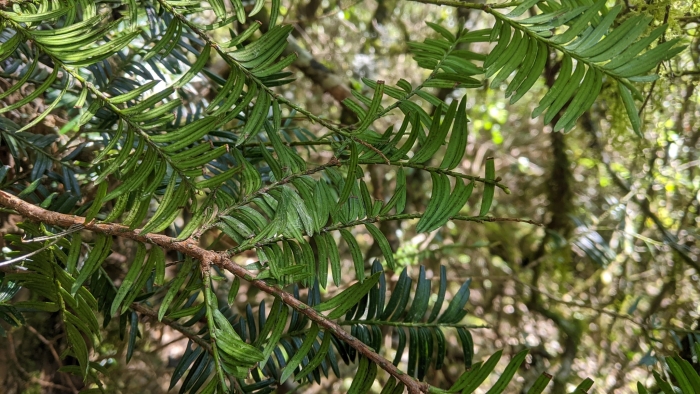Maire’s Yew
(Taxus mairei)
Maire’s Yew (Taxus mairei)
/
/

© Cheng Te Hsu
CC BY-SA 4.0
Image By:
© Cheng Te Hsu
Recorded By:
Copyright:
CC BY-SA 4.0
Copyright Notice:
Photo by: © Cheng Te Hsu | License Type: CC BY-SA 4.0 | License URL: http://creativecommons.org/licenses/by-sa/4.0/ | Uploader: chengte | Publisher: iNaturalist |









Estimated Native Range
Summary
Taxus mairei, commonly known as Maire’s yew, is an evergreen conifer native to the understory of cool, moist, mountainous forests in Nepal, Assam, central and southern China, Hainan, Taiwan, and Vietnam. It typically grows to a height of 10-15 meters with a similar spread, and features a dense, conical form. The bark is reddish-brown and peels in thin flakes. The leaves are dark green, linear, and arranged spirally on the stem, contributing to the plant’s overall texture. Maire’s yew produces inconspicuous male and female cones on separate plants, with the female cones developing into red, berry-like arils that are attractive to birds.
Maire’s yew is valued for its ornamental foliage and its adaptability to shade, making it suitable for woodland gardens, shaded borders, and as a specimen plant in large landscapes. It is also used in traditional Chinese medicine, and its bark and needles contain paclitaxel, a compound used in cancer treatments. In cultivation, Maire’s yew requires well-drained, acidic to neutral soil and can tolerate full shade to part shade conditions. It is relatively low maintenance but may be susceptible to root rot if planted in poorly drained soils. There are no popular garden cultivars widely available, but the species itself is appreciated for its medicinal properties and evergreen presence.CC BY-SA 4.0
Maire’s yew is valued for its ornamental foliage and its adaptability to shade, making it suitable for woodland gardens, shaded borders, and as a specimen plant in large landscapes. It is also used in traditional Chinese medicine, and its bark and needles contain paclitaxel, a compound used in cancer treatments. In cultivation, Maire’s yew requires well-drained, acidic to neutral soil and can tolerate full shade to part shade conditions. It is relatively low maintenance but may be susceptible to root rot if planted in poorly drained soils. There are no popular garden cultivars widely available, but the species itself is appreciated for its medicinal properties and evergreen presence.CC BY-SA 4.0
Plant Description
- Plant Type: Tree, Shrub
- Height: 20-30 feet
- Width: 15-20 feet
- Growth Rate: Slow
- Flower Color: N/A
- Flowering Season: Non-Flowering
- Leaf Retention: Evergreen
Growth Requirements
- Sun: Full Sun, Part Shade
- Water: Medium
- Drainage: Medium, Fast
Common Uses
Low Maintenance, Potted Plant
Natural Habitat
Understory of cool, moist, mountainous forests
Other Names
Common Names: Chinese Yew
Scientific Names: , Taxus mairei, Taxus chinensis var. mairei, Taxus kingstonii, Taxus mairei, Taxus mairei, Taxus mairei var. speciosa, Taxus speciosa, Taxus sumatrana subsp. mairei, Taxus wallichiana var. mairei
GBIF Accepted Name: